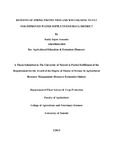Benefits of spring protection and willingness to pay for improved Water supply in Emuhaya District
Abstract
Supply of reliable and safe water is essential for human health and survival, food security,
empowernment of women and protection of natural resources. Lack of water impedes economic
development, prevents progress towards gender equality and puts people's health in danger. This
study focussed on benefits of water spring protection on the lives of community members and
institutions governing the use and management of the protected facility. There was a further
assessesment of environmental benefits by the respondents willingness to pay (WTP) and the
factors influencing them to pay. Semi-structured questionnaire was used to generate qualitative
and empirical data on 200 randomly selected respondents using protected and unprotected
springs in Emuhaya District of Vihiga County. Contigent valuation method was used for
valuation of environmental benefits. Logit model was adopted to evaluate. factors influencing
WTP while the benefits and institutions of existing water structures were analyzed using
descriptive methods. An independent t-test was also run to determine whether the socioeconomic
variables were statistically significant between households with protected springs and
those with unprotected springs. The results indicated that lack of cooperation, insufficient
funds/poor contributions and lack of frequent meetings were the main challenges hindering
major developments towards water supply. These challenges mostly arose in the water user
groups. Majority of respondents using protected springs (56.2%) had not received training on the
use of the facility. The results also revealed that spring protection had significant benefits in
terms of time saving, water quality and sanitation, agriculture, health aspects and social capital.
Upto 93% of respondents were willing to pay in order to receive satisfactory spring protection
services with a mean WTP of Ksh 111. Regression results showed that source of support,
membership to group, farm size and time were significant in explaining the variations in the
Citation
A Thesis Submitted to The University of Nairobi in Partial Fulfillment of the Requirement for the Award of the Degree of Master of Science in Agricultural Resource Management (Resource Economics Option)Publisher
Plant Science & Crop Protection, University of Nairobi

